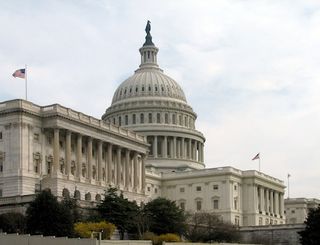House Passes Email Privacy Act

The House Monday (Feb. 6) unanimously passed the E-mail Privacy Act.
A version of the bill, which boosts protections of information stored in the cloud, passed the House unanimously in the last session of Congress in April and supporters were hoping for clean passage in the Senate as well, but it was held over by the Senate Judiciary Committee after amendments were offered that could have undone a compromise approach.
The baseline bill updates the Electronic Communications Privacy Act to require the government to get a probable cause criminal warrant to access emails, social media posts and other online content stored in the cloud by internet service providers and other email service providers, like Google. In a nod to the longevity of cloud storage, it eliminates the 180-day sunset on stored communications. Previously a warrant was not required for communications stored beyond 180 days.
"If the government wants to read your emails, then they should be required to obtain a warrant just like they would need in order to read your letters, search your hard drive or listen in on your phone calls," said bill backer Rep. Darrell Issa (R-Calif.). Technology has made incredible advances over the years, but the privacy laws for digital communications just haven't kept pace. Right now, the rules governing how and when the government can access a person's emails, photos, documents and other online communications are outdated and do not provide for the same Fourth Amendment protections given to on-paper or in-person communications. The bill we've passed today is an important privacy safeguard that will help cement Americans' rights in the digital age."
“Today, the House took a major step forward in bringing our nation’s electronic communications privacy laws into the 21st century,” said Linda Moore, president of TechNet. “These laws haven’t been updated since 1986, and modernization is badly needed. TechNet applauds the House for sending a clear message that the U.S. Constitution applies to private digital information just as it applies to physical property. We urge the Senate to take up this legislation as soon as possible.”
"Updating our laws to reflect the way the world works in the 21st century has been one of my top priorities in Congress," said Rep. Suzan DelBene (D-Wash.), who co-sponsored the reintroduction of the bill. "When current law affords more protections for a letter in a filing cabinet than an email on a server, it’s clear our policies are woefully outdated. I’ve supported a number of different proposals to reform our electronic privacy laws and will continue to push for those, but today’s passage of the Email Privacy Act is a great step forward for Americans’ civil liberties. Now it’s up to the Senate to act and ensure Americans are guaranteed the privacy protections most think they already have.”
“We applaud members of Congress for recognizing the need to clarify an important Constitutional protection for citizens in the digital age and expediting the passage of the Email Privacy Act," said Computer & Communications Industry Association Ed Black. "At a time when citizens’ private information and communications are usually stored online, these privacy protections are imperative—and long overdue. We now urge the Senate to take up and pass the Act."
Multichannel Newsletter
The smarter way to stay on top of the multichannel video marketplace. Sign up below.
"Support for constitutional protections, like requiring the government to get a warrant to read email, remain bipartisan. House leadership and the sponsors of the Email Privacy Act have made a powerful statement by moving the legislation so quickly in the new Congress," said Center for Democracy and Technology VP of policy Chris Calabrese. "The House has acted to protect Americans' privacy. Now it's up to the Senate and the President to do the same."
“Adobe applauds members of the House who voted overwhelmingly to protect the digital privacy rights of Americans by supporting the Email Privacy Act," the company said in a statement. "The bill brings digital privacy protections into the 21st century, closing archaic loopholes that allow government agencies to access content stored with cloud service providers for more than 180 days without a warrant. As a member of the Digital Due Process Coalition, Adobe believes the personal information of customers that is saved on our servers should have the same 4th Amendment protections as a paper document in a desk drawer.
"With such overwhelming bipartisan support in the House, the Senate should move quickly to approve the Email Privacy Act. Failure to update ECPA, which is more than 30 years old, could make the American technology sector less competitive to foreign rivals."
Contributing editor John Eggerton has been an editor and/or writer on media regulation, legislation and policy for over four decades, including covering the FCC, FTC, Congress, the major media trade associations, and the federal courts. In addition to Multichannel News and Broadcasting + Cable, his work has appeared in Radio World, TV Technology, TV Fax, This Week in Consumer Electronics, Variety and the Encyclopedia Britannica.

